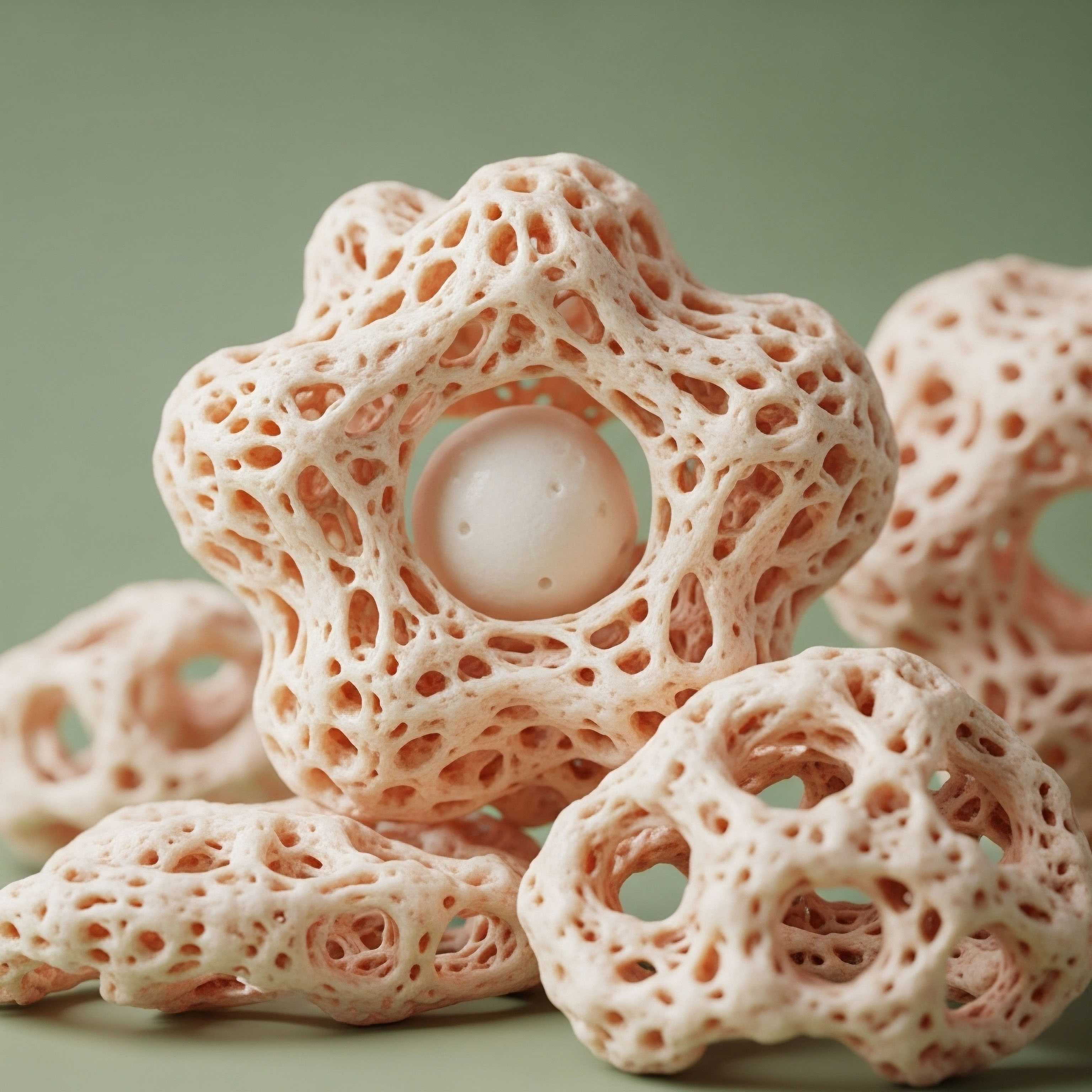

Fundamentals
The experience of watching your own cognitive sharpness seemingly fade with time is a deeply personal and often unsettling process. You might notice a name that once came instantly now sits just out of reach, or that multitasking feels more like a frantic juggling act than a familiar rhythm.
This lived reality, this sense of a changing internal landscape, is the critical starting point of our discussion. It is a valid and important observation of your own biological system in flux. The question of whether hormonal optimization, specifically addressing testosterone levels, can act as a countermeasure to this decline is a profound one. It speaks to a desire to reclaim a feeling of wholeness and full cognitive capacity.
To understand the connection, we must first appreciate the brain as an endocrine organ, a target for the precise chemical messages sent by hormones. Testosterone is one of these vital messengers. Its influence extends far beyond its commonly known roles in muscle development and libido.
Within the brain, testosterone interacts with a vast network of receptors, influencing everything from the birth of new neurons, a process called neurogenesis, to the health of existing neural connections. It helps modulate the release of neurotransmitters, the chemical couriers that carry signals between brain cells, directly impacting mood, focus, and mental energy. The hormone also possesses neuroprotective properties, helping to shield brain cells from the damage caused by oxidative stress and inflammation, two key drivers of the aging process.

The Brain’s Changing Hormonal Environment
As men age, there is a natural and gradual decline in testosterone production, a physiological shift sometimes referred to as andropause. This is not a sudden event but a slow tapering that begins in the thirties and continues throughout life. The consequences of this hormonal shift are systemic, affecting the entire body, including the central nervous system.
The brain, accustomed to a certain level of testosterone for optimal functioning, begins to operate in a state of relative deficiency. This hormonal deficit can manifest in ways that you might subjectively experience as “brain fog,” a subtle loss of executive function, or a dip in verbal memory. It is the biological underpinning of a feeling that your mental engine is not running with the same power it once did.
The decline in testosterone does not happen in isolation. It is part of a complex cascade of age-related changes. For instance, lower testosterone levels are often associated with an increase in inflammatory markers throughout the body. Chronic low-grade inflammation is now understood to be a significant contributor to neurodegeneration and cognitive impairment.
Therefore, the link between testosterone and cognition is not a simple, linear relationship. It is an intricate dance of interconnected systems, where a change in one hormonal pathway can have ripple effects across the entire neuro-hormonal axis, influencing everything from mood regulation to metabolic health, all of which have a direct bearing on cognitive performance.

Can Restoring Levels Restore Function?
This leads us to the central question ∞ If declining testosterone contributes to cognitive decline, can restoring it reverse the process? The premise is biologically sound. Reintroducing optimal levels of this key hormone could theoretically replenish the brain’s signaling environment, enhance neuroprotection, and mitigate some of the inflammatory processes that accelerate cognitive aging.
The goal of testosterone optimization is to re-establish a physiological state that is more characteristic of a younger, healthier biological system. This is a move toward restoring the body’s innate operational blueprint.
A decline in testosterone is a key factor in the complex process of age-related cognitive changes, impacting the brain’s chemistry and structure.
However, the human body is a system of immense complexity. While the logic is compelling, the outcomes are not always predictable for every individual. The effectiveness of testosterone optimization for cognitive enhancement depends on a multitude of factors, including the individual’s baseline testosterone levels, the presence of other underlying health conditions, lifestyle factors like diet and exercise, and even genetic predispositions.
The scientific evidence presents a varied picture, with some studies showing significant cognitive improvements, while others find more modest or even negligible effects. This variability underscores the need for a personalized approach, one that considers the unique biological context of each person. The journey to cognitive vitality is not about finding a universal cure, but about understanding and addressing the specific imbalances within your own system.


Intermediate
Moving from the foundational understanding of testosterone’s role in the brain to the clinical application of hormonal optimization requires a shift in focus. We are now entering the realm of protocols, dosages, and measurable outcomes. The central aim of Testosterone Replacement Therapy (TRT) in this context is to re-establish a physiological hormonal environment that supports optimal neurological function.
This is achieved by administering exogenous testosterone to bring serum levels back into a healthy, youthful range. The process is a carefully managed recalibration of the body’s endocrine system.
A standard protocol for male hormone optimization often involves weekly intramuscular or subcutaneous injections of Testosterone Cypionate, a bioidentical form of the hormone. This method provides a stable and predictable release of testosterone, avoiding the significant peaks and troughs that can be associated with other delivery methods.
The dosage is carefully titrated based on an individual’s baseline lab values and symptomatic response, with the goal of achieving total testosterone levels in the upper quartile of the normal reference range for young, healthy men. This targeted approach ensures that the therapy is both effective and minimizes the potential for side effects.

Balancing the Endocrine System
Effective testosterone optimization is a sophisticated process of balancing multiple hormonal pathways. Administering exogenous testosterone can suppress the body’s natural production by down-regulating the Hypothalamic-Pituitary-Gonadal (HPG) axis. To counteract this, protocols often include medications like Gonadorelin.
Gonadorelin is a synthetic analogue of Gonadotropin-Releasing Hormone (GnRH), which stimulates the pituitary gland to release Luteinizing Hormone (LH) and Follicle-Stimulating Hormone (FSH). This, in turn, signals the testes to continue their own production of testosterone and maintain testicular volume and fertility.
Another critical component of many TRT protocols is the management of estrogen. Testosterone can be converted into estradiol, a form of estrogen, through the action of the enzyme aromatase. While some estrogen is necessary for male health, including bone density and cognitive function, excessive levels can lead to undesirable side effects such as water retention and gynecomastia.
To manage this, an aromatase inhibitor like Anastrozole may be prescribed. This oral medication blocks the conversion of testosterone to estrogen, helping to maintain a healthy and balanced hormonal profile. The interplay of these medications demonstrates the systems-based approach required for successful hormonal therapy.

What Does the Clinical Evidence Show?
The clinical research on TRT and cognitive function has yielded a complex and sometimes contradictory body of evidence. Some studies have demonstrated clear benefits, while others have shown more modest or domain-specific improvements.
For instance, a meta-analysis of multiple randomized controlled trials found that testosterone supplementation in older men resulted in a small but statistically significant improvement in overall cognitive scores, with the most notable gains seen in executive function.
Another study focusing on older men with obesity and low testosterone found that TRT, when combined with a diet and exercise program, led to significant improvements in global cognition, attention, and memory compared to placebo. This suggests that testosterone optimization may be most effective when implemented as part of a comprehensive wellness strategy.
Clinical protocols for testosterone optimization are designed to mimic the body’s natural hormonal environment, often requiring a multi-faceted approach to achieve balance and efficacy.
Conversely, the Testosterone Trials (TTrials), a large set of seven clinical trials, reported that testosterone treatment for one year did not significantly improve memory or other cognitive domains in older men with low testosterone and age-related memory impairment.
This highlights the variability in outcomes and suggests that the cognitive benefits of TRT may be dependent on the specific population being studied and the cognitive measures being used. The conflicting results across different studies underscore that testosterone optimization is not a one-size-fits-all solution for cognitive decline. The response is highly individualized and influenced by a range of physiological and lifestyle factors.
The following table provides a simplified comparison of findings from two key studies, illustrating the nuances in the research landscape:
| Study Aspect | Gregori et al. (2021) | The Testosterone Trials (Cognition Arm) |
|---|---|---|
| Participant Profile | Older men with obesity, physical frailty, and low testosterone. | Older men with low testosterone and age-related memory impairment. |
| Intervention | Testosterone therapy combined with a diet and exercise program. | Testosterone therapy alone. |
| Primary Cognitive Outcomes | Significant improvement in global cognition, attention, and memory. | No significant improvement in verbal memory, visual memory, or executive function. |
| Key Takeaway | TRT may enhance cognition, particularly when part of a broader lifestyle intervention in a specific high-risk group. | TRT alone may not be sufficient to reverse age-related cognitive decline in all older men with low testosterone. |
This comparative data reveals the importance of context in evaluating the potential cognitive benefits of testosterone therapy. Factors such as metabolic health, physical activity, and the presence of other comorbidities can significantly influence the brain’s response to hormonal optimization. A clinically astute approach, therefore, involves a thorough assessment of the individual’s overall health status to determine if they are a suitable candidate for this therapeutic modality.


Academic
An academic exploration of the relationship between testosterone optimization and cognitive function requires a deep dive into the complex, interconnected systems of neuroendocrinology, immunology, and metabolic science. The central hypothesis posits that restoring youthful testosterone levels can counteract age-related cognitive decline. This is not simply a matter of replenishing a single hormone.
It is an intervention into a dynamic biological system where testosterone acts as a powerful signaling molecule with pleiotropic effects on neural architecture and function. The efficacy of such an intervention is contingent upon a cascade of cellular and molecular events that are influenced by the individual’s unique physiological landscape.
Testosterone’s neuroactive properties are mediated through multiple pathways. It can exert its effects by binding to androgen receptors located throughout the brain, particularly in regions critical for memory and executive function, such as the hippocampus and prefrontal cortex.
Additionally, testosterone can be locally aromatized into estradiol, which then acts on estrogen receptors, or reduced to dihydrotestosterone (DHT), which has its own potent androgenic effects. This local conversion allows for a highly nuanced modulation of neural activity. For example, estradiol has been shown to promote synaptic plasticity, the cellular mechanism underlying learning and memory, while testosterone itself has been found to enhance neuronal survival and resilience against excitotoxic insults.

The Interplay of Hormones and Neuroinflammation
Age-related cognitive decline is increasingly understood as a process driven by chronic, low-grade inflammation, often termed “inflammaging.” In the brain, this manifests as microglial activation and the release of pro-inflammatory cytokines, which can impair synaptic function and contribute to neuronal loss. Testosterone possesses potent anti-inflammatory properties.
It has been shown to suppress the production of inflammatory mediators and modulate the activity of immune cells within the central nervous system. A decline in testosterone levels with age may, therefore, create a more permissive environment for neuroinflammation to take hold.
From a systems-biology perspective, restoring optimal testosterone levels can be seen as an intervention aimed at recalibrating the neuro-immune axis. By dampening the inflammatory cascade, testosterone optimization may help to preserve the delicate microenvironment required for healthy neuronal function.
Research has indicated that men undergoing androgen deprivation therapy for prostate cancer, which dramatically lowers testosterone levels, are at an increased risk for dementia. This provides compelling, albeit indirect, evidence for the neuroprotective role of testosterone and suggests that its absence can accelerate neurodegenerative processes. The cognitive benefits observed in some TRT studies may be attributable, in part, to this anti-inflammatory mechanism of action.

How Do Metabolic Factors Influence Outcomes?
The cognitive response to testosterone optimization cannot be divorced from the individual’s metabolic health. Conditions such as insulin resistance and obesity, which are common in older adults and often associated with low testosterone, create a state of systemic inflammation and metabolic dysfunction that is detrimental to brain health.
Insulin signaling pathways in the brain are crucial for synaptic plasticity and neurotransmitter regulation. When these pathways become impaired, cognitive function suffers. Testosterone plays a key role in maintaining insulin sensitivity and promoting lean body mass.
The potential for testosterone optimization to reverse cognitive decline is deeply intertwined with its ability to modulate neuroinflammation and restore metabolic homeostasis.
One randomized clinical trial provided compelling evidence for this synergistic relationship. In a group of older men with obesity and hypogonadism, those who received testosterone therapy in conjunction with an intensive lifestyle intervention showed significantly greater improvements in global cognition, attention, and memory compared to those who received a placebo with the same lifestyle intervention.
Crucially, multiple regression analyses revealed that changes in peak oxygen consumption, muscle strength, and total testosterone were all independent predictors of the improvement in global cognition. This suggests that the cognitive benefits of TRT are amplified when combined with improvements in physical fitness and metabolic health. The therapy may create a permissive hormonal environment that allows the brain to better capitalize on the benefits of exercise and improved metabolic function.
This table details the specific cognitive domains impacted in a key clinical trial, providing a granular view of the potential benefits:
| Cognitive Domain | Measurement | Observed Effect in TRT + Lifestyle Group |
|---|---|---|
| Global Cognition | Composite z-score | Significant increase compared to placebo group. |
| Attention/Information Processing | Sub-component z-score | Significant improvement over the placebo group. |
| Memory | Sub-component z-score | Marked increase, showing a substantial effect size. |
| Executive Function | Sub-component z-score | No significant difference noted between groups in this specific trial. |
This level of detail reveals that the cognitive effects of testosterone are not uniform across all domains. The pronounced impact on memory and attention in this metabolically compromised group highlights the targeted nature of its effects.
The lack of a significant change in executive function in this particular study also underscores the complexity of the issue and the need for further research to delineate the precise mechanisms and contexts in which testosterone optimization yields the most profound cognitive benefits. The evidence points toward a model where testosterone acts as a systemic regulator, whose cognitive effects are realized through its integrated influence on inflammation, metabolism, and neural signaling.

References
- Gregori, Giulia, et al. “Cognitive response to testosterone replacement added to intensive lifestyle intervention in older men with obesity and hypogonadism ∞ prespecified secondary analyses of a randomized clinical trial.” The Journals of Gerontology ∞ Series A, vol. 76, no. 11, 2021, pp. 2039-2047.
- Resnick, Susan M. et al. “Testosterone treatment and cognitive function in older men with low testosterone and age-associated memory impairment.” JAMA, vol. 317, no. 7, 2017, pp. 717-727.
- Gava, Giacomo, et al. “Testosterone supplementation and cognitive functioning in men ∞ a systematic review and meta-analysis.” The Journal of Clinical Endocrinology & Metabolism, vol. 104, no. 6, 2019, pp. 1945-1962.
- Examine.com. “Can testosterone replacement therapy and weight management improve cognition in older men?” Study Summary, 1 Sept. 2021.
- Tan, Sherilyn, et al. “Effects of testosterone supplementation on separate cognitive domains in cognitively healthy older men ∞ a meta-analysis of randomised controlled trials.” Comprehensive Psychoneuroendocrinology, vol. 4, 2020, p. 100014.

Reflection
You have now journeyed through the intricate biological landscape connecting testosterone to the very mechanics of thought and memory. The information presented here is a map, detailing the known pathways, the clinical signposts, and the areas still under exploration.
This knowledge is a powerful tool, shifting the perspective from one of passive observation of age-related changes to one of active, informed inquiry. The fundamental purpose of this deep exploration is to provide you with a framework for understanding your own body’s signals.
The path forward is one of personalization. The studies and protocols discussed reveal a clear truth ∞ there is no single answer, only a series of questions that can guide a personalized strategy. What is your unique hormonal profile? What is your metabolic and inflammatory status?
How do these measurable biological facts align with your subjective experience of your own cognitive function? The answers to these questions form the basis of a truly effective wellness protocol. The ultimate goal is to move beyond generic solutions and toward a precise, data-driven recalibration of your own biological system, designed to support not just longevity, but a long and vibrant healthspan, with cognitive vitality at its core.

Glossary

hormonal optimization

testosterone levels

andropause

executive function

metabolic health

cognitive decline

testosterone optimization

biological system

diet and exercise

testosterone replacement therapy

hormonal environment

gonadorelin

cognitive function

anastrozole

older men

low testosterone

clinical trials

cognitive benefits

testosterone therapy

age-related cognitive decline

neuroendocrinology

neuroinflammation




